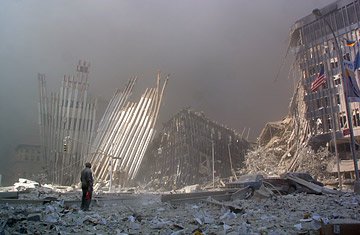
A man stands in the rubble, and calls out asking if anyone needs help, after the collapse of the first World Trade Center Tower in New York City on September 11, 2001.
(2 of 10)
Roko Camaj owned the most enviable views in New York City. As a window cleaner for the World Trade Center's Twin Towers, his work space offered staggering panoramas of the city he adopted when he arrived from Montenegro in 1969. Most days, he surveyed the surroundings from indoors, operating a remote cleaning machine from the rooftop; but the windows on the 107th floor could not accommodate the machine, and he would attend to them manually, suspended from a harness. Camaj, 60, was on the observation deck on the 107th floor in 1993 when a bomb hit the building. It took him 2 1/2 hours to descend by stair, his mouth covered with one of his damp sponges, his doffed shirt covering the mouth of a pregnant woman he escorted down. He was back at work the next day. "He said working that high up took some getting used to at first, but he found it peaceful, his escape," says his son Vincent, one of Camaj's three children. On days off, Camaj, a Roman Catholic Albanian, also liked to keep things clean and orderly around the house, mowing the grass, renovating the kitchen and, above all, spending time with his family, from whom he originally hid the nature of his risky job. When he started work at the World Trade Center in 1973, he told his wife he worked inside. He called her at 9:14 a.m. last Tuesday from the 105th floor of the south tower. "He told my mom he was with about 200 other people, and he was just waiting for the O.K. to head down," says Vincent. "He told her not to worry, we're all in God's hands." --By Michele Orecklin
Hell's Kitchen's Angels
The stack became a heap, then a small mountain. By Thursday night, the 4-ft. mound of tributes to the fire fighters of Engine 54/Ladder 4 in New York City's Hell's Kitchen--food donations, flowers, cards, American flags and photos of the station's fire fighters missing at the World Trade Center site--had grown so big that a second pile of flowers had to be started alongside the entrance. Captain Richard Parenty found the tributes so gratifying they were almost painful: "It's so good to feel appreciated, and it's draining. Even the outpouring of support is draining emotionally."
Engine 54 sent 15 men to the first report of trouble Tuesday morning. None came back. The 45 fire fighters left behind spent an exhausting week consoling their colleagues' loved ones, digging through the wreckage, hopeful and fearful of finding their brethren. "I don't have words," says 12-year veteran Tom Hogan. "We have no information for the families of our guys. I just consider them missing. Hopefully there'll be a few more miracles today." When their 24-hr. shifts end, they return to the site on their own time. "It's not a 9-to-5 thing," says Parenty. "I'll be going home, there's time for that. But this is kind of important now." Tuesday was Michael Drennan's first day on the job as a fire fighter-in-training. "One of the guys, Mike Brennan, we joked 'cause our names were similar, he showed me around the house," says Drennan. "He's missing now. It's some way to start off my career."
